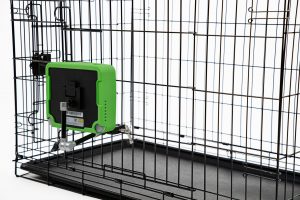Many people buy dogs for companionship. But now pets can have their own playmates when their owners are away – companion robots that can help to monitor, feed, and entertain them.
Sophia Qiao, a 30-year-old who lives in the southern Chinese city of Shenzhen, spent 2,000 yuan (S$400) to buy her cat Tuantuan and then spent almost three-quarters of that amount again on a robot partner for it.
The robot companion is called Ebo and was developed by Shenzhen-based start-up Enabot. Qiao said it has been a great help, especially when she was on a one-week trip with her mother recently.
“I was able to talk and interact with my cat in real-time [while I was travelling],” Qiao said. “My cat loves the laser teasing function … and I was able to play with Tuantuan [via Ebo] every one or two hours.”
Ebo is fist-sized and shaped like a ball. With a Wi-fi connection, it allows cat owners to monitor and play with their cats remotely via a mobile app and even record videos.
Apart from a high-definition camera and speaker, Ebo also uses artificial intelligence (AI) to recognise a cat’s face and can follow them, even detecting the cat’s mood and adapting its behaviour accordingly.
The small robot has wheels and can roll around the floor on its own. Built-in sensors help it to avoid obstacles and a self-return function allows it to dock itself when in need of a charge. It can also use a laser light to play with the cat.
Qiao said the robot had reduced her anxiety about leaving Tuantuan at home while travelling.
“China’s older population is growing and singles have emotional needs so there are more and more people raising pets and the pet economy is booming,” said Xiao Fei, a senior analyst at research firm Analysys. “The pet-related robot industry though is still at a very early stage compared with robots used in education and the catering industry.”
In China, the number of households owning pets has increased from 69.3 million in 2013 to 99.8 million in 2018, up about 44 per cent over the five years, according to market research firm Frost & Sullivan. And pet owners are becoming a new breed of power purchasers in China.
China’s pet industry was estimated to be worth 172.2 billion yuan in 2018 and is forecast to reach 472.3 billion yuan by 2023, according to data from Frost & Sullivan.
On Kuaishou, there was a live streaming pet show every 5.4 seconds in May and views of pet-related short videos topped 700 million a day, according to a report from the Chinese short video platform.
Founded in 2018, Enabot launched its first product Ebo at the end of last year. It has raised about 10 million yuan in angel and pre-A financing rounds over the past two years and now has over 40 staff with a majority of them working in product research and development, according to Zhu Hong, co-founder of Enabot.
“We’ve seen that AI and robotics have huge momentum for the transformation of various industries, but it’s been more on the academic and industry side in the past,” said Zhu, who is also a cat owner. “As technologies advance, robots can be used in more open spaces and to interact with humans.”
Zhu graduated with a doctorate in electronic and computing engineering in 2014 from the Hong Kong University of Science and Technology. Before founding Enabot, she worked for Chinese drone maker DJI.
Enabot also launched a campaign last November for Ebo on crowdfunding platform Kickstarter. Around 2,467 backers pledged a total of HK$3.4 million (S$601,000) for the project.
Although the company has only sold several thousand Ebos to date, its customers come from over 60 countries with Japan, Europe and the US among the most popular markets, Zhu said.
Ebabot sells the product via its official website and works with local distributors overseas.
In China, it has opened online shops on Alibaba Group Holding’s Tmall and Taobao marketplaces and launched the pro version of Ebo in August during the Taobao Maker Festival, an annual event organised by Alibaba to promote the country’s young entrepreneurs, emerging brands and idea creators.
Enabot’s competitors include Nasdaq-listed pet products maker Dogness, which has also developed a smart iPet robot.
It is much bigger than Ebo with a height of about 30 centimetres, and the iPet robot can also be remotely controlled with 360-degree movement, with functions including an HD camera with night vision, a pet treat dispenser, laser teasing and voice interaction.
South Korean start-up VARRAM also entered the Chinese market in January, raising 180,000 yuan from 316 backers from April to May in a crowdfunding project on JD Finance, the financial technology arm of JD.com. The robot can also dispense pet treats in addition to moving around and making sounds.
In future, Enabot plans to develop more products for dogs and focus on the China market, Zhu said.
“We hope that ‘cold’ technologies [like robots] can help serve people in their daily ‘warm’ lives and help people enjoy their family time more.”
Lire la suite: www.scmp.com






